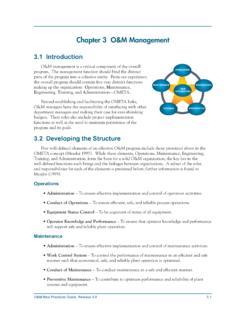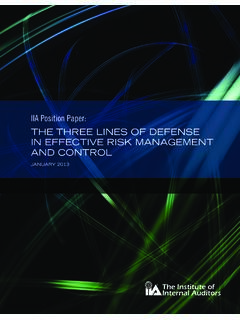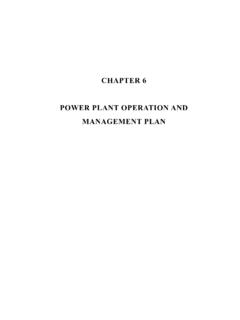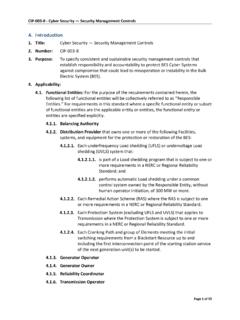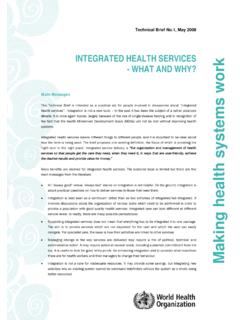Transcription of Introduction to ISO 19011, Guidelines for Auditing ...
1 May 2016. An ENLAR Compliance Services White Paper Introduction to iso 19011 , Guidelines for Auditing management Systems Executive Summary An important internal audit function is evaluating the effectiveness and efficiency of an organization 's control processes. These control processes include the policies, procedures and activities in place within an organization for managing risk and achieving organizational objectives. In the standards developed by the International organization for Standardization (ISO), control processes are defined as an organization 's management system. To conform to the ISO standards, organizations are required to establish and maintain management system processes. Organizations are also required to establish internal audit programs. The Guidelines for understanding these internal audit requirements are set out in iso 19011 , Guidelines for Auditing management Systems.
2 The purpose of this white paper is to provide an Introduction to the audit Guidelines set out in the iso 19011 :2011 standard. This white paper also summarizes some of the challenges that are likely to be important topics of discussion during the upcoming revision of ISO. 19011. ENLAR Compliance Services (2016) Page 1 of 8. May 2016. Standards for Organizational Control Processes As business operations have become increasingly complex, establishing control processes has become critical for organizations. Equally important is establishing robust audit programs for assessing the effectiveness of these control processes in managing risk and achieving the organization 's objectives. Several organizations have developed standards and frameworks to assist organizations in establishing and Auditing organizational control processes.
3 These include the Committee of Sponsoring Organizations of the Treadway Commission (COSO), the International organization for Standardization (ISO) and The Institute of Internal Auditors (The IIA). COSO Internal Control Framework In 1992, the Committee of Sponsoring Organizations of the Treadway Commission (COSO) published its Internal Control Integrated Framework. This document was updated and expanded in The COSO framework provides an approach organizations can use to develop and maintain systems of internal controls for achieving their established objectives. The COSO Framework consists of five core components: Control environment Risk assessment Control activities Information and communication Monitoring A key part of the monitoring component is conducting periodic evaluations to determine whether appropriate internal controls are present and functioning.
4 Internal auditors are encouraged to use the COSO Framework for assessing the effectiveness of an organization 's system of internal controls. ISO management System Approach The International organization for Standardization (ISO) published its first management system standard in 1987. This standard, ISO 9001, set out requirements for a quality management system. In 1996, ISO published its next management system standard, ISO 14001, which established requirements for an environmental management system. Since then, the development of ISO management system standards has grown exponentially. Today, there are over 20 discipline-specific management system These standards have been written to provide a basis for third-party certification, and many organizations have obtained certification to multiple management system standards.
5 Based on the surveys conducted by ISO, over a million organizations worldwide have obtained third-party certification of their quality management Many of those organizations have implemented environmental and occupational health and safety management systems as well. ENLAR Compliance Services (2016) Page 2 of 8. May 2016. Facilitating management System Integration To facilitate management system integration within organizations, ISO has established a mandatory framework for its management system standards. This framework (commonly referred to as Annex SL ) sets out mandatory definitions, a common high-level structure and core requirements for ISO's management system These core management system requirements are organized into the following clauses: Context of the organization Leadership Planning Support Operations Performance evaluation Improvement A key component of all of the ISO management system standards is the requirement that an organization have an internal audit program in place to evaluate whether its control processes are effectively implemented and maintained.
6 The Guidelines for establishing an effective internal audit program are set out in iso 19011 , Guidelines for Auditing management International Professional Practices Framework The IIA International Professional Practices Framework (IPPF) recognizes the importance of evaluating organizational control processes. Performance Standard 2130 states, The internal audit activity must assist the organization in maintaining effective controls by evaluating their effectiveness and efficiency and by promoting continuous improvement.. The IIA has developed several Practice Advisories and Practice Guides relevant to the assessment of different types of operations and the evaluation of the effectiveness of controls for responding to various kinds of risk. Several of these are directly related to topics that are also addressed in ISO management system standards.
7 This includes: Practice Advisory 2120-1 Assessing the Adequacy of Risk management Processes Practice Advisory 2130-1 Assessing the Adequacy of Control Processes Practice Advisory Information Reliability and Integrity ENLAR Compliance Services (2016) Page 3 of 8. May 2016. Introduction to the iso 19011 Guidelines ISO first published audit Guidelines in 1990 and 1991. These initial Guidelines focused on Auditing quality systems. When ISO published ISO 14001 in 1996, it also published Guidelines on Auditing environmental management systems. In 2002, these six separate quality and environmental audit standards were consolidated into one standard for both types of management system Auditing . That standard is iso 19011 . When iso 19011 . was revised in 2011, the scope of the standard was expanded to cover all management system Auditing .
8 The iso 19011 :2011 standard contains guidance on the following topics: Principles of Auditing Managing an audit program Audit activities Competence and evaluation of auditors Principles of Auditing Clause 4 of iso 19011 sets out six general principles that guide the performance of management system audits. These principles are: Integrity Fair presentation Due professional care Confidentiality Independence Evidence-based approach Conformance with these principles is necessary to ensure an audit is an effective and reliable tool in support of management policies and controls. Managing an Audit Program Clause 5 of iso 19011 provides guidance on establishing and managing an audit program that meets the requirements set out in the ISO management system standards. The required audit program activities include: Establishing audit procedures and methodologies Selecting audit personnel and defining roles and responsibilities Defining objectives, criteria and scope for each audit Ensuring the audit results are communicated iso 19011 also suggests approaches that can be considered for assessing the effectiveness of the audit program itself to ensure it is meeting the objectives set by the organization .
9 ENLAR Compliance Services (2016) Page 4 of 8. May 2016. Audit Activities Clause 6 of iso 19011 outlines the general steps followed in planning and conducting individual audits. These steps are: Initiating the audit Preparing for the audit Conducting the audit Preparing and distributing the audit report Completing the audit Conducting audit follow-up The guidance in iso 19011 :2011 currently focuses primarily on the activities typically associated with on-site audits, audits conducted at the physical location where the activities being audited are conducted. Competence and Evaluation of Auditors Clause 7 of iso 19011 outlines criteria for selecting auditors for management system audits. In the beginning of this clause, a four-step process is suggested for evaluating auditor competence.
10 This is followed by guidance concerning the types of competence needed for performing management system audits. To be competent, auditors need both 1) generic knowledge and skills needed to audit management systems and 2) discipline-specific knowledge needed to audit a particular type of management system in a particular business sector. Audit Program Challenges In early 2016, ISO approved the next revision of the iso 19011 standard. This revision will be conducted within an ISO Project Committee (referred to as a PC) that has been established specifically for this work PC 302. There are a number of audit challenges to be addressed in the upcoming revision of iso 19011 . Some of these challenges include: Conducting risk-based audits Impact of evolving information technologies Addressing complex business structures Safeguarding audit objectivity Ensuring competence of audit personnel ENLAR Compliance Services (2016) Page 5 of 8.
